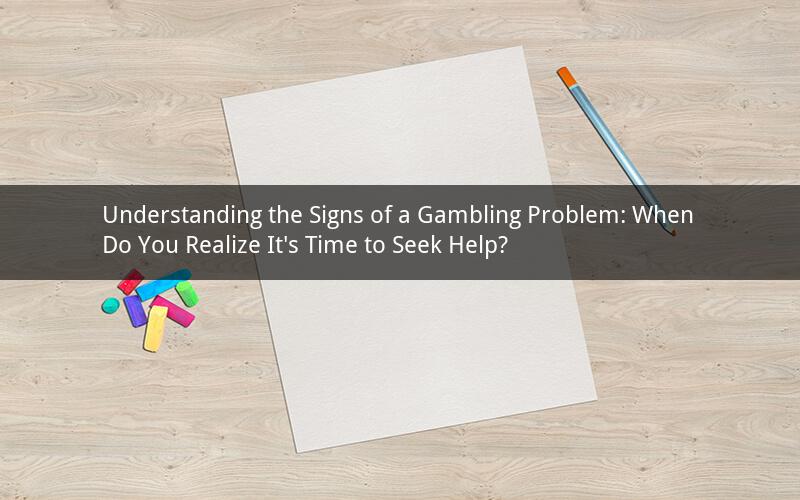
Introduction:
Gambling has become a prevalent form of entertainment, but it can quickly spiral into an addiction if not approached responsibly. Identifying the signs of a gambling problem is crucial for taking the necessary steps towards recovery. This article explores the indicators that suggest you may have a gambling problem and when it's time to seek professional help.
1. Uncontrollable Urge to Gamble:
One of the most apparent signs of a gambling problem is an overwhelming urge to gamble. If you find yourself constantly thinking about gambling, planning your next bet, or even lying about your gambling activities, it may be a sign that you have a gambling problem.
2. Neglecting Responsibilities:
As your gambling addiction progresses, you may start neglecting your responsibilities. This can manifest in various ways, such as skipping work or school, failing to meet financial obligations, or ignoring personal relationships. If you find yourself prioritizing gambling over your responsibilities, it's a clear indication that you have a gambling problem.
3. Financial Struggles:
Gambling can lead to significant financial problems. If you find yourself borrowing money, selling personal belongings, or experiencing financial distress due to gambling, it's a strong indication that you have a gambling problem. The inability to control your spending and the constant pursuit of more money can be warning signs of an addiction.
4. Emotional and Psychological Symptoms:
Gambling addiction can have a profound impact on your emotional and psychological well-being. If you experience increased levels of stress, anxiety, depression, or mood swings, these may be symptoms of a gambling problem. Additionally, if you feel a sense of relief or excitement after gambling, it may be a sign that you're using gambling as a coping mechanism for underlying issues.
5. Denial and Rationalization:
Denial is a common defense mechanism for individuals struggling with a gambling problem. You may find yourself rationalizing your gambling behavior, convincing yourself that you can control it or that it's not a big deal. This denial can prevent you from seeking help and acknowledging the severity of your situation.
When Do You Know It's Time to Seek Help?
Recognizing when it's time to seek help is crucial in overcoming a gambling problem. Here are some indicators that suggest it's time to take action:
1. Financial Ruin:
If your gambling addiction has led to financial ruin, it's a clear sign that you need to seek help. The consequences of financial instability can be far-reaching, affecting your career, relationships, and overall well-being.
2. Emotional and Psychological Distress:
If you're experiencing significant emotional and psychological distress as a result of your gambling addiction, it's crucial to seek help. Professional therapy can provide the support and tools needed to address these underlying issues.
3. Relationship Damage:
Gambling addiction can strain relationships with family, friends, and loved ones. If you find yourself alienating those around you or feeling guilty about your gambling behavior, it's time to seek help to mend these broken relationships.
4. Legal Consequences:
If your gambling addiction has led to legal issues, such as theft, fraud, or other illegal activities, it's essential to seek help. Legal consequences can have severe long-term effects on your life, and addressing the root of the problem is crucial.
5. Exhaustion and Desperation:
If you're feeling exhausted, desperate, or at the end of your rope, it's a sign that you need to seek help. The cycle of gambling addiction can be mentally and physically taxing, and professional support can provide the necessary guidance and resources to break free from this cycle.
Frequently Asked Questions:
1. How do I know if I have a gambling problem?
If you experience an overwhelming urge to gamble, neglect your responsibilities, struggle financially, or experience emotional and psychological symptoms, it's possible that you have a gambling problem.
2. Can gambling addiction be cured?
Gambling addiction is a treatable condition. With professional help, therapy, and support, many individuals have successfully overcome their gambling addiction.
3. How can I get help for a gambling problem?
You can seek help from various sources, including counseling services, support groups, and rehabilitation centers. It's important to reach out to professionals who specialize in treating gambling addiction.
4. Will seeking help for a gambling problem affect my relationships?
Seeking help for a gambling problem can actually strengthen your relationships. By addressing the root of the problem, you can rebuild trust and mend broken relationships.
5. Can I recover from a gambling problem on my own?
While some individuals may find success in overcoming a gambling problem on their own, seeking professional help significantly increases your chances of recovery. Professional support provides the necessary tools, guidance, and accountability to overcome addiction.
Conclusion:
Identifying the signs of a gambling problem and recognizing when it's time to seek help is crucial in overcoming addiction. By addressing the underlying issues and seeking professional support, individuals can break free from the cycle of gambling addiction and regain control over their lives. Remember, help is available, and recovery is possible.